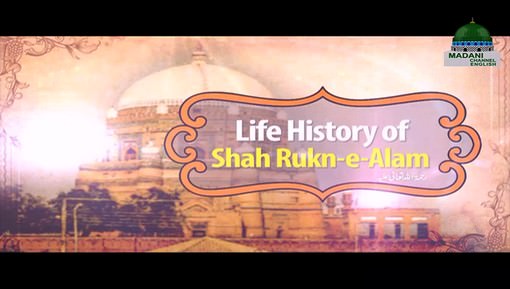
Godly People
The Saintly Pole: Shah Rukn-e-Alam رَحْمَةُ الـلّٰـهِ عَلَيْه
Mohammad Nasir Jamal Attari Madani
In the Indo-Pak sub-continent, amongst the blessed personalities who lit the luminous candle of Islam through continuous effort in night and day, led wandering hearts to the oasis of Islam, and satiated thirsty souls with the elixir of love and gnosis, is the celebrated saint of the Suhrawardiyya order, Sayyidunā Rukn-e-Alam Abū al-Fatḥ Shah Rukn al-Dīn رَحْمَةُ الـلّٰـهِ عَلَيْه.
He was born on 9th Ramadan, 649 AH/25th November, 1251 AD, in the city of saints, Multan, Pakistan.[1] His grandfather, Shaykh al-Islam Bahāuddīn Zakariyya Multānī رَحْمَةُ الـلّٰـهِ عَلَيْه, named him "Rukn al-Dīn ".[2]
Shah Rukn-e-Alam opened his eyes in a house where he witnessed the delightful scenes of his grandfather’s dedicated worship, his father Ṣadruddīn ʿĀrif’s piety and abstinence, and his mother’s night vigils. His mother used to pay special attention to matters of purity and cleanliness. Whenever she suckled him, she used to first perform wudu. She had memorised the Qur'an and recited it in full every day, even while breastfeeding her son. If the azan was called during this time, he would stop drinking milk and listen to the azan carefully.[3]
The mother of Shah Rukn-e-Alam had ordered all the servants in the house not to teach the child any other word except for the name of Allah nor to utter any other word in his presence. Soon, the young child uttered his first word, “Allah.”[4]
His scholarly education was given to him by his father, Shaykh Ṣadruddīn ʿĀrif, and his spiritual training was imparted to him by his grandfather, Sayyidunā Bahāuddīn Zakariyya. When he was four years, four months, and four days old, his grandfather made him recite the basmala and his noble father initiated his memorization of the Quran. It was his habit to verbally recite a quarter of a juz from the Holy Quran three times which was sufficient for him to memorise it.[5]
After memorizing the Qur'an, he started to seek sacred knowledge, and at the age of only 16, he graduated as a scholar of Islam with proficiency in all major disciplines including tafsir, hadith, fiqh, Arabic, literature, poetry, mathematics, and logic.[6]
His father and grandfather loved him dearly, and he reciprocated that with utmost respect. With the blessings of these two figures, the hallmarks of sainthood appeared in him at a young age. He was an embodiment of sincere worship and devotion, righteousness, humility, compassion, forbearance, and chivalry.
One day, his grandfather, Shaykh Bahāuddīn Zakariyya رَحْمَةُ الـلّٰـهِ عَلَيْه, had taken off his Imamah and placed it on the bedstead. Shah Rukn-e-Alam, who was four years old at the time, picked up his grandfather’s Imamah and placed it on his head. His father, who was sitting nearby, scolded him, but Shaykh Bahāuddīn Zakariyya Multani said, “Do not say anything to him, because he is deserving of it. I have gifted him this Imamah.” Therefore, this Imamah was preserved in the same way in a box. When Shah Rukn-e-Alam became the spiritual successor, he donned the same Imamah and wore the cloak which was granted to his grandfather by Sayyidunā Shaykh Shihābuddīn Suharwardi.[7]
He was the true spiritual heir of his father and grandfather. He spread the call to righteousness for 52 years and showed the path of truth to countless disciples and spiritual aspirants.[8] His spiritual successors went on to become great examples of piety and nobility.
His selected aphorisms
* As long as a person does not abandon bad traits, he is included in the ranks of animals and wild beasts.[9]
* It is impossible to cleanse the heart unless Allah Almighty blesses a person with His grace and kindness.[10]
* For a person to see his own faults is a sign of Allah’s grace.[11]
* A person should try to control his limbs from doing anything contrary to the teachings of Islam. He should avoid immoral gatherings, such as gatherings that distance the person from Allah Almighty and drive him to the world. He should avoid those who seek the world.[12]
He passed away on Tuesday, 7th Jumada al-Ula, 735 AH/13th January, 1335 AD, while he was prostrating.[13] His shrine, considered a historic landmark of Multan, is situated in the cemetery built by Ghiyath al-Dīn Tughluq and is a locus of spiritual manifestations and blessings visited by scholars and the public throughout the year.
[1] Seerat-e-Pak Hazrat Shah Rukn al-Deen wa-‘Alam, p. 5
[2] Allah Kay Khaas Banday, p. 624, Tazkirah Awliya Pak-o-Hind, p. 96
[3] Yaadgar-e-Soharwardia, p. 181, Khazeena al-Asfiya, vol. 4, p. 81
[4] Yaadgar-e-Soharwardia, p. 181
[5] Seerat-e-Pak Hazrat Shah Rukn al-Deen wa-‘Alam, p. 10
[6] Mehfil-e-Awliya, p. 257
[7] Khazeena al-Asfiya, vol. 4, p. 81
[8] Tuhfa al-Kiram, p. 359
[9] Akhbar al-Akhyar, p. 63
[10] Akhbar al-Akhyar, p. 63
[11] Akhbar al-Akhyar, p. 63
[12] Akhbar al-Akhyar, p. 64
[13] Multan aur Silsilah Suharwerdi, p. 129, Seerat-e-Pak Hazrat Shah Rukn al-Deen wa-‘Alam, p. 169







Comments